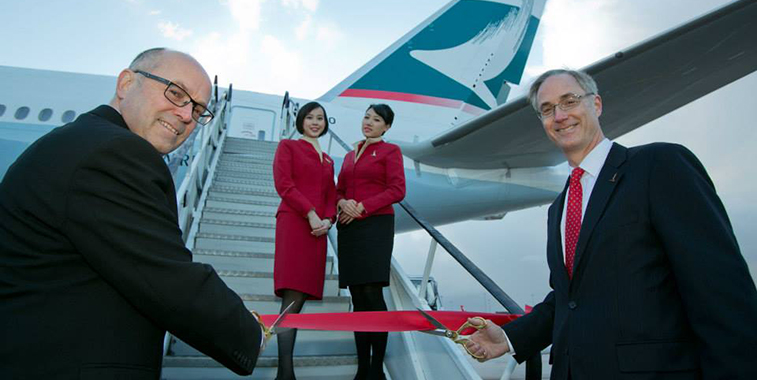The executive director of Beijing Engineering Construction Group has said his firm expects to do $300m to $400m worth of work in the UK in the next five years.
Chinese money and Chinese companies are expected to become big players in the UK construction industry over the next decade.Â
One report suggested that China’s capital investment in Britain’s built environment might amount to $169bn in that time.
The report also foresaw the entry of Chinese contractors into the UK civils and construction market, initially through joint ventures. If this is also true, then history will record that the company that blazed the trail was the Beijing Engineering Construction Group (BCEG). Back in October 2013 it formed a joint venture with UK contractor Carillion, and joined the consortium that was developing the UK’s first ‘airport city’, in Manchester.
(The photograph shows, from left, David Partridge of developer Argent, Manchester Airports Group chief executive Charlie Cornish, and BCEG executive Xing Yan after ratifying the joint venture for the £800m Manchester Airport City in March 2014.)
People are approaching us and we are talking, but we are not going for it– Lau Yew Cheong, Beijing Engineering Construction Group
Now that the company has been in the UK for long enough to become acquainted with the British way of building, GCR talked to Lau Yew Cheong, the 64-year-old executive director of BCEG, about why he decided to take the plunge, and what he plans to do next in the UK.
“At this moment we are still quite new to the UK,” he says, “so we will just concentrate on Airport City for the next two or three years before we try to venture out.”
BCEG has a staffed office at Manchester Airport. Although the firm has been linked to a number of other joint ventures with UK contractors, Cheong says nothing has been agreed. “In the next five years we hope to do maybe $300m to $400m of work. People are approaching us and we are talking, but we are not going for it.”
Cheong says BCEG had been examining developments in Europe for some time before it chose to become involved in Manchester Airport City. The key factor was that the potential benefits were much greater than an ordinary construction scheme.
“China has got a very extensive programme of investing overseas and our company has been looking for an opportunity in European and UK, so when the opportunity came to invest in Manchester Airport City we saw it as a very good project because it’s the first of its kind in the UK, and it’s got a lot of potential. There are a lot of airport cities coming up in other parts of the world and we also see a lot of potential for airport cities back in China later. We also saw that our partners were all reputable and big players and that reduced the risk of investment.”
As well as Carillion, the $1.25bn scheme is being developed by the Greater Manchester Pension Fund and Manchester Airports Group (MAG), the airport operator owned by the Manchester borough councils. More comfort was offered by the UK government, which made its enthusiasm for China’s involvement clear, and had also made the development the flagship of its enterprise zone policy.
Another factor in BCEG’s decision was that it thought it had identified a market for the airport city’s facilities, in particular its high-tech manufacturing plants. “We liked the advanced manufacturing base, which offers a different opportunity of investment than just residential. We can see the potential, because now the Chinese are going out of China in droves to invest, and many of these of small and medium-sized industries, and Airport City fits in very well for them.
“Manchester is a well-connected city and the final destination of the projects will not just be the UK – it is Europe, and you can also see the UK has a vast set of Commonwealth connections, so tapping into the UK market means also tapping into some Commonwealth country markets – mainly Africa but also Australian and New Zealand. If you have a product that’s made in the UK it’s a lot easier to be accepted in these countries.”

After striking an historic deal with Cathay Pacific, the first direct flight to Hong Kong took off from Manchester on 8 December. It’s the only UK airport outside London to offer direct flights to China.
The airport city team went to China in the summer to bring that message to the business communities in Beijing, Shanghai, Tianjin and Shenzhen. Cheong said: “We were mainly presenting to manufacturers and logistics people and financial institutions and some property developers. The first line was connectivity – connectivity is important because when Chinese come to do business in the UK they want to be connected with other parts of the world.”
On this, Manchester is forging ahead. After striking an historic deal with Cathay Pacific, the first direct flight to Hong Kong took off from Manchester on 8 December. It’s the only UK airport outside London to offer direct flights to China.
MAG chief executive Charlie Cornish told newspaper The Manchester Evening News that the airport is the final stages of securing a direct route to Beijing, and that the first flight could happen early in 2015.
He said the two new routes would lead to nearly 300,000 passenger journeys a year.
But work is needed on the regional infrastructure. John Atkins, the property director of MAG, told GCR: “I think it’s really important to improve the rail network and to begin HS2 [the high-speed rail link between London and Manchester]. If you look at the north-south links and the importance of London to the UK economy, and how that links into Manchester being the UK’s second city, then it’s clearly needed.Â
“It’s also a matter of gaining the full benefit of the scale of the northern region – you are looking at a bigger population being serviced if you are able to link together in a more connected way than they are at the moment – by road and rail in particular, where the infrastructure leaves a lot to be desired.”
For now, though, Cheong is impressed by Manchester, which he says is less “stressful” than back home.
“I find living in Britain is very comfortable,” he says. “First, working in here is less stressful than working in Beijing. There are fewer traffic jams and less pollution. More important is the partners we’re working with – our partners are very easy to negotiate with, so that makes my life a lot easier here. And of course there are also interesting social events. Some of the Chinese restaurants are very authentic.”






